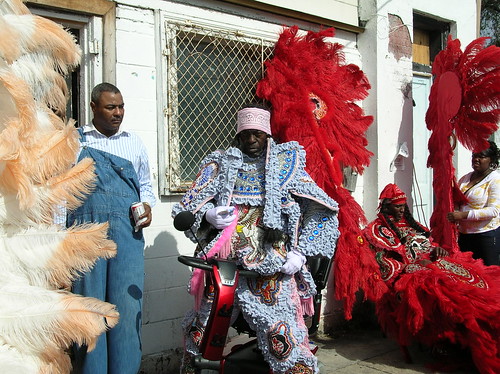
This Tuesday, we learned that Bo Dollis had passed. That's him on the scooter in the above photo, Mardi Gras Day 2008.
WWLTV:
NEW ORLEANS - Big Chief Theodore "Bo" Dollis, who led the Wild Magnolia tribe of Mardi Gras Indians in performances around the world, has died. He was 71.A few things about "Carnival anthems." If you're from New Orleans.. meaning, if you spent the especially nostalgic portion of your childhood here.. they're more accurately Carnival carols, almost a sacred kind of music tied to a holiday season. There's a more or less standard playlist that most people can rattle off in a few minutes. The most famous recordings of these songs were all made roughly between the 1940s and 70s. The earlier ones are rock n' roll songs, the later ones are classic funk. Each has its own distinctive quality. None of these is more distinctive than Bo Dollis's voice.
His death was announced by the Mardi Gras Indian Hall of Fame and confirmed by his son.
Dollis masked as a Mardi Gras Indian for more than five decades.
Though he had no formal musical training, Dollis and The Wild Magnolias recorded several albums, spreading the music of the Mardi Gras Indians worldwide and featuring Dollis' distinctive voice.
He is best known to many for his signature vocals on Wild Magnolia songs including "Handa Wanda" and "New Suit." Their song "Smoke My Peace Pipe (Smoke It Right)," climbed onto the Billboard singles chart. In 1974, they released the album that introduced the recorded version of "Handa Wanda," which is now a familiar Carnival anthem.
This is from the Advocate:
A musical pioneer, Dollis expanded the reach of the Mardi Gras Indian sound by recording traditional chants and blending them with funk and rhythm-and-blues music. The Wild Magnolias performed at the first New Orleans Jazz and Heritage Festival in 1970.
With Dollis as lead vocalist, the Wild Magnolias recorded several albums, including “The Wild Magnolias” in 1974 and “They Call Us Wild” in 1975.
“Bo Dollis created the soundtrack to Mardi Gras with the Mardi Gras Indian sound,” Big Chief Juan Pardo of the Gold Comanche tribe said.
Dollis may be best known for his raw vocals, exemplified in the Mardi Gras classic “Handa Wanda,” which opens with Dollis’ powerful shout.
This is from NOLA.com music writer Keith Spera
In the pantheon of New Orleans music's great voices, Bo Dollis' remarkable rasp, equal parts gravel and joy, ranks near the top. It is just as unmistakable, if the stylistic opposite, of Aaron Neville's delicate, fluttering falsetto.
Stanton Moore, the Galactic drummer, once observed that Dollis' voice, like those of Robert Plant and James Brown, is "rooted to the center of the earth. It's the most soulful, powerful shout that I've ever heard. It's heartbreaking and triumphant at the same time."
Before Dollis, Indian chants were already bubbling up into popular music. Some of the titles NOLA.com's Allison Fensterstock cites here are among the Carnival carol cannon themselves.
By the middle of the 20th century, the chants sung by Mardi Gras Indians in the streets of New Orleans had begun to work their way onto wax. In the mid-1950s, folklorist Samuel Charters had collected field recordings of Indians in New Orleans, later released on the Smithsonian Folkways label. In the '50s and early '60s, Danny Barker, James "Sugar Boy" Crawford and the Dixie Cups had released swinging jazz and rhythm and blues arrangements of Indian tunes like "Tootie Ma Is a Big Fine Thing" and "Iko Iko." Earlier than all of that, Jelly Roll Morton had demonstrated Indian melodies on the piano for Alan Lomax, during Lomax's landmark, marathon Library of Congress interview sessions.After those Wild Magnolias records were made, Dollis's shout was forever entwined with the image of the Mardi Gras Indian in the public imagination... so much of that image being shrouded in mystery.
Indian tunes were making their way into popular music – though, outside of Charters' recordings captured in the field, none of them were performed by actual masking Indians. In 1970, Wild Magnolias Big Chief Bo Dollis, who died Tuesday (Jan. 20), changed that. He did so with the help of his longtime friend Monk Boudreaux — Big Chief of the Golden Eagles Mardi Gras Indians — and a young Quint Davis.
Until very recently Indian culture existed somewhat on the fringes of what was considered the mainstream Carnival experience. It's only really within the last decade that it's become something you'd expect most tourists to even know about much less seek out in the neighborhoods. Even locally, it was often relegated to a back page curiosity. (Its less than comfortable relationship with the police has improved only somewhat.)
Still, over the course of roughly a generation, this unique and rich folk tradition has steadily come to be more widely understood and celebrated locally. Dollis's music was indispensable in transmitting the essence of that culture to a wider public.
""He was the modern musical face of the Mardi Gras Indian culture that broke through to the outside world," (Quint) Davis said. His voice "came out of his personality. Bo wasn't an angry Indian. He was a joyous Indian. Bo had this joy about the whole culture. He had this joy about the fact that he was leading it, and he could sing it. That infused what he was singing."
We've been lucky enough to catch the Wild Magnolias on Mardi Gras Day pretty often over the years. Their home base is right around the corner from where we are. They used to come out of the H&R Bar on Dryades Street. It burned down in 2001. Here's an old picture I took of the still standing facade in 2005.
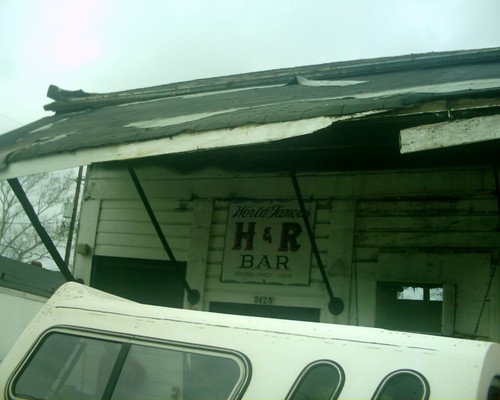
They're still on the same block, though. Here's another picture from way back in 2005. That's Bo standing outside of the Sportsman's Corner. I remember pointing him out to Daisy. It was, I think, only her second Mardi Gras that year. "Who's Bo Dollars?" I remember her asking.
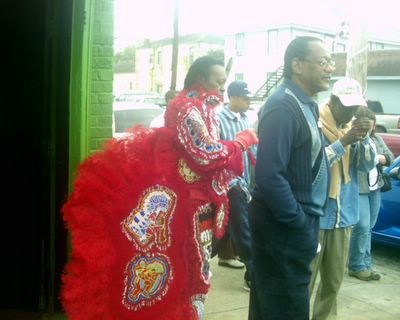
The corner of Second and Dryades is a nexus of activity on Mardi Gras morning.
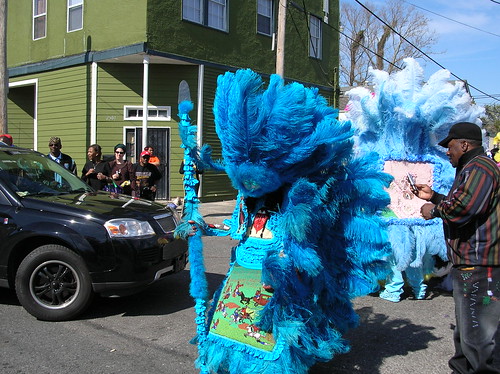
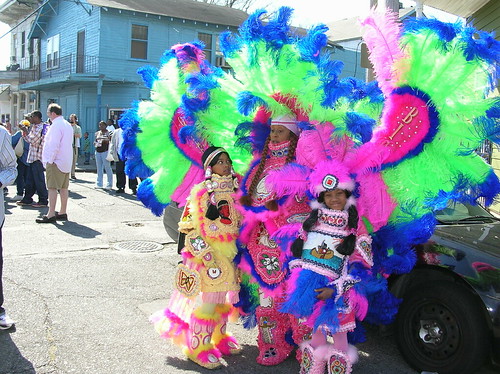
In 2008, I got about 30 seconds of Bo leading a round of Indian Red. Sorry about the grainy video. It was way back in the aughts and the technology was bad.
Anyway, you can see his health was already not so great by that point. He had taken to using a scooter to get around when out with the group. The most recent photo I have of that is from 2009.
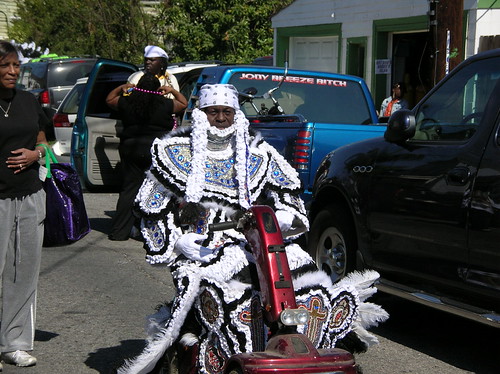
That same year, Menckles had knitted these purple green and gold beer coozies that fit around your neck. It was a pattern she made up on her own and it took her a long time to figure out how she wanted them to work. We only had two of them. But for some reason she kind of spontaneously decided to give hers to Bo... just as a decorative thing to hang from his handlebar. I'm sure he thought she was nuts, but he accepted it.
By some coincidence, Bo Dollis is featured on this year's Jazzfest poster. Fittingly enough, the man himself was a poster image for an entire genre of folk art and music.
3 comments:
Great photos and summation!
Nicely done, Jeffrey. Thanks.
I enjoyed your article.
Post a Comment